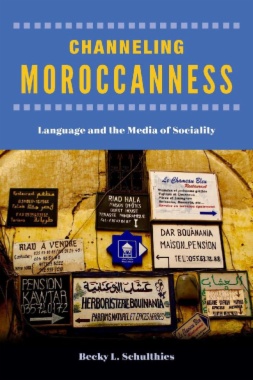

What does it mean to connect as a people through mass media? This book approaches that question by exploring how Moroccans engage communicative failure as they seek to shape social and political relations in urban Fez. Over the last decade, laments of language and media failure in Fez have focused not just on social relations that used to be and have been lost but also on what ought to be and had yet to be realized. Such laments have transpired in a range of communication channels, from objects such as devotional prayer beads and remote controls; to interactional forms such as storytelling, dress styles, and orthography; to media platforms like television news, religious stations, or WhatsApp group chats.
Channeling Moroccanness examines these laments as ways of speaking that created Moroccanness, the feeling of participating in the ongoing formations of Moroccan relationality. Rather than furthering the discourse about Morocco’s conflict between liberal secularists and religious conservatives, this ethnography shows the subtle range of ideologies and practices evoked in Fassi homes to calibrate Moroccan sociality and political consciousness.